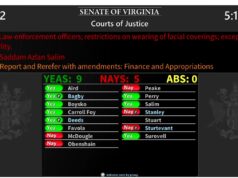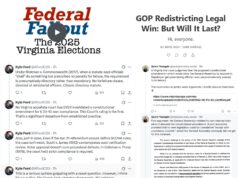 I don’t know about you, but I find this fascinating…in an appalling kind of way.
I don’t know about you, but I find this fascinating…in an appalling kind of way.
At [last week’s Virginia Public Access Project – VPAP] luncheon table sipping my purloined iced tea, I noticed the VPAP program. Its biggest contributors ($10,000 each) are Alpha Natural Resources and Dominion. The former is a Bristol-based coal firm that bought out Massey Energy whose officials are the target of a federal probe that they spent a decade conspiring against mine safety officials and the result was the death of 29 in a blast at Upper Big Branch mine in Montcoal, W.Va., on April 5, 2010, the worst in 40 years.
Alpha says it is trying to correct the defects in the Massey organization in bought but it, too, is a huge player on the political front and has its own agenda, such as keeping alive a destructive type of mining called mountaintop removal. Dominion has a highly sophisticated advocacy operation since its survival depends on regulation. Other big-time VPAP contributors are car dealers, tobacco giant Altria, Comcast, lobbying law firm McGuireWoods, health groups, a few other utilities, and so on. Even NOVA real estate John “Til” Hazel is on the list, but much farther down.
I really didn’t see any citizen groups or anyone that wasn’t bound to benefit by giving legal gifts of jumbo shrimp, lakeside vacations or money to someone in a position of power in the state.
The problem, therefore, isn’t the fact that anything is illegal, but just about everything is and it is peculiar to Virginia…
That’s right, this is a state in which just about everything goes, where wealthy corporations – most of them polluters and other bad actors – can wine and dine our legislators, take them on golfing trips, treat them to weekends at the Homestead, give them unlimited campaign donations, fly them to France to check out cafes in Paris uranium mining, etc, etc. It’s so bad that Virginia finished #47 out of 50 states in “corruption risk”, as “one of nine states with no statewide ethics commission, one of four states with no campaign finance limits and one of only two states (South Carolina is the other) where the part-time legislators handpick the judges before whom many of them practice law.”
Virginia is also a state in which the system is almost completely rigged against the public interest (let alone the environment and other “common goods”), and in favor of the well heeled and well connected. Thus, Virginia’s state legislature has “one of the shortest meeting schedules in the country;” the elections are in odd-numbered years to minimize turnout; General Assembly members receive minimal salaries and/or staff support, which means that the full-time/well-compensated corporate lobbyists pretty much are left to run the place; and “lawmakers have exempted a key institution, the State Corporation Commission – which regulates businesses, utilities, financial institutions, insurance, railroads – from Virginia’s Freedom of Information Act.”
Oh, and of course we don’t even know what goes on 90% of the time in the General Assembly, because most “business” is conducted with no reporters, no cameras, even no recorded votes! And finally, the legislators have gerrymandered the state so that the vast majority of districts are “safe” Republican or “safe” Democratic. No, this is not democracy – not even close. Instead, it’s some sort of bizarre corporatocracy, in which the corporations fund the politicians and, in turn, the politicians dole out favors to the corporations.
What is the “check and balance” on this horrendous situation? Well, theoretically, there are elections, but with only a small percentage of people voting in “odd year” elections, with an even more miniscule percentage voting in primaries (let alone party conventions, where only a few thousands people out of Virginia’s 8 million population choose the nominees!), and with most of the incumbents entrenched in “safe” districts they’ve drawn for themselves anyway, it’s not much of one. What does that leave? In theory, there’s the media, but that’s on life support, with a few exceptions.
Finally, there’s disclosure, which is where VPAP comes in. And in many ways VPAP does excellent work; personally, I find them a valuable resources. The problem, though, is that only a tiny percentage of the crap that actually goes on in Virginia government is ever “disclosed,” and even then good luck figuring out what the quid pro quos/relationships/etc. were. Also, what percentage of Virginians do you think ever pour through the VPAP disclosure database to try and figure out who’s influencing who? My guess: very, very low. Sure, the public should do that, but in reality they don’t and they’re not going to. It’s just a fact.
Finally, as Peter Galuzka points out, even VPAP itself has its issues. I mean, VPAP does great work – for what it does. But the question is, why doesn’t it do a LOT more? As one commentor wrote at Bacon’s Rebellion
Given the iron grip of the lobbying industry on its purse strings, VPAP will never be an advocate for change unless those companies want the change. I think the big donors to VPAP have both noble motives and less than noble motives, and their less than noble motive is to 1) keep disclosure and clarity at a certain level – but not take it too far and 2) make sure they are at the White Hat table if such an effort springs up outside of VPAP.
And seriously, given VPAP sponsors like these (Verizon, Alpha Natural Resources, Dominion, Altria, Consol Energy, The Virginia Association of Realtors, etc.), does anyone think that will ever happen? If so, what are you smoking exactly, because it probably is illegal in Virginia?!? LOL



![CNU Wason Center Poll of Virginia: Trump Approval at Just 34%; “narrow majority support a constitutional [redistricting] amendment”](https://bluevirginia.us/wp-content/uploads/2026/01/wason0128-1-238x178.jpg)







